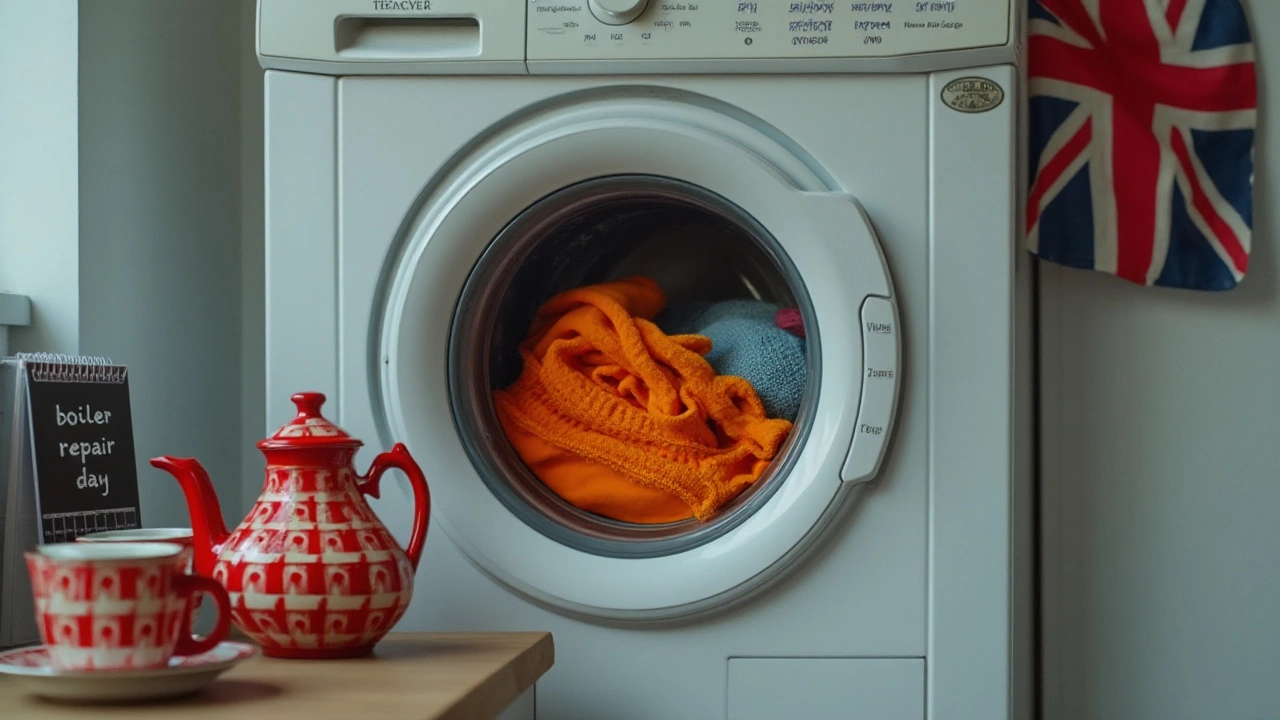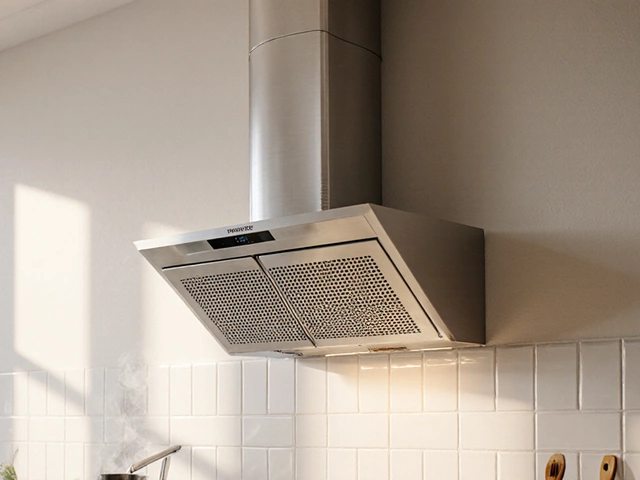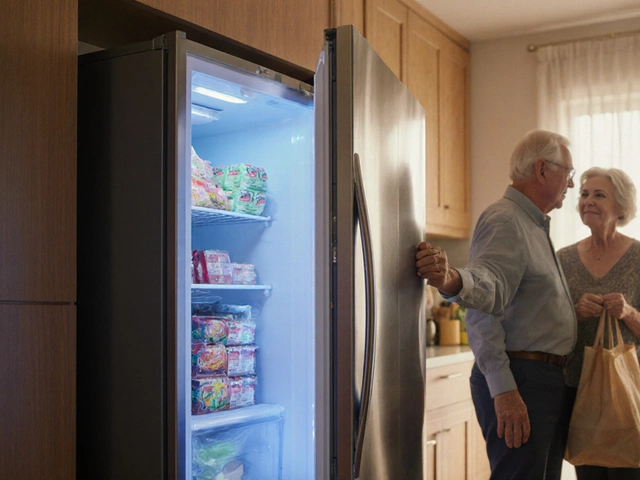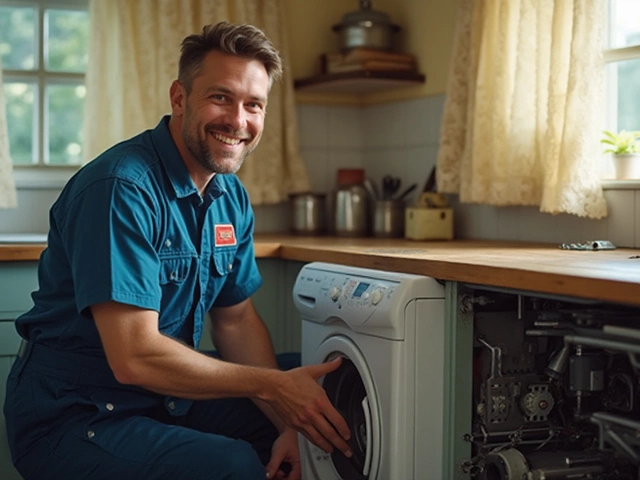A broken boiler can throw a spanner in the works, leaving us shivering and wondering how all this affects our day-to-day chores. Vital though it may be for hot water supply and heating, many don't realize how household appliances, like washing machines, can continue to function independently when the boiler gives way.
While there are common misconceptions that intertwine the operations of these appliances, it's helpful to understand the basics. Let's explore the co-dependence, or lack thereof, between a washing machine and a boiler, and what you can do when the boiler decides to take an untimely vacation.
- Understanding the Boiler's Role
- Washing Machines and Their Water Needs
- Common Misconceptions
- Living Without a Boiler
- Washing Machine Efficiency Tips
- Preparing for Unexpected Breakdowns
Understanding the Boiler's Role
In the cozy cocoon of our homes, the boiler stands as a silent sentinel poised to deliver warmth with the turn of a dial. Its significance, though often overlooked, is pivotal in maintaining the delicate balance of comfort we cherish. Boilers are integral to ensuring a home is not just habitable, but truly livable, with a reliable supply of hot water and heating. This makes them a cornerstone of modern living, yet their complexity and operational scope remain a mystery to many. At its core, a boiler heats water. It can use various fuels such as natural gas, electricity, or oil, making it versatile to different settings and needs. It's the heart of central heating systems, pumping warmth through radiators or underfloor systems, enveloping every corner of the house in a cozy embrace. Interestingly, many people believe that any disruption to the boiler affects all household chores and appliances, linking the inconvenience of reduced heat to broader functionality issues, yet this is not always the case.
Contrary to popular belief, not all household appliances rely on the boiler for operational efficiency. Take, for example, the washing machine. While it does require access to water, these machines are typically designed to heat water to the required temperature themselves, utilizing internal heating elements. This clever design enables them to continue functioning even if a home's primary heating system encounters problems. There is a widespread misconception that household boilers and their functionality are inextricably linked to the operation of all plumbing and water-related appliances. This misunderstanding can lead to unnecessary concern during breakdowns, when in fact many devices have inherent checks and balances to ensure continuous operation.
Importance of Routine Maintenance
Just as any other complex machine, a boiler requires regular check-ups to function smoothly. Maintenance should ideally be carried out by professionals, who can ensure that the system is free from faults and running at peak efficiency. While some homeowners may be tempted to perform DIY fixes on their boiler systems, this can lead to unintended complications without the specialized tools and knowledge necessary. Boilers are complex, with numerous interconnected components, and any misstep might create a cascade of failures. Regular care also translates into improved energy efficiency, allowing homeowners to save on energy bills while extending their boiler's lifespan. A little attention and care go a long way in preventing unnecessary breakdowns and ensuring reliable operation across all weather extremes."A smoothly running boiler is akin to having an invisible helper, one that often goes unnoticed until a problem arises," noted Richard Davies, an expert at the Home Appliance Journal.
| Boiler Fuel Types | Efficiency | Environmental Impact |
|---|---|---|
| Natural Gas | High | Moderate |
| Electricity | Medium | Low |
| Oil | High | High |
Understanding the boiler's role is more than just knowing how it heats up water. It's about appreciating how this system, while crucial, is just one part of a larger ecosystem within our homes. Recognizing which appliances are dependent and which can operate independently ensures we are better prepared for any hiccups along the way, enabling us to manage contingencies with knowledge and confidence.
Washing Machines and Their Water Needs
Understanding the way a washing machine operates is crucial when it comes to dealing with home appliance problems. Many people think that their washing machine's needs are intricately linked to the boiler, especially when it comes to heating water. However, most modern washing machines are equipped with their own heating elements, allowing them to warm up the cold water directly drawn from your tap. This means that they don't necessarily depend on the hot water your boiler supplies. Indeed, the cleverness behind these appliances has made our lives significantly easier, ensuring we get clean laundry whether or not our household heating is in top condition.
Washing machines typically utilize only the cold water supply from your plumbing system, which then goes through internal mechanisms where the machine heats it to the desired temperature. This is why many models don't even require a hot water connection anymore, and some even come with a cold fill only, which relies entirely on their internal heater to reach those steamy temperatures when washing whites or heavily soiled items. The beauty of this independence is that you aren't entirely at the mercy of your heating system’s ups and downs, making appliance management a bit less stressful compared to traditional setups.
Back in the day, appliances heavily relied on the hot water provided by domestic heating systems. However, as times have changed, manufacturers realized the need for a more resourceful and autonomous approach to household home maintenance. The aim has always been to save energy and help households run more efficiently, which brings us to plastic pipes and existing plumbing standards' role in this. According to appliance expert George Douglas, “Many households remain unaware that washing machines cater quite well on their own these days, providing an energy-saving approach adaptable even during boiler outages.”
When the temperature control is set, washing machines adjust to type-specific programs, tailoring water temperatures specific to the fabrics being washed, be it cottons, synthetics, or delicates. This feature ensures minimal water wastage and optimizes detergent use. With these functions taking away dependence on the boiler, many people find themselves pleasantly surprised that they can carry on with their laundry activities regardless. Isn’t it interesting to find that a washing machine’s independence goes unnoticed until we’re forced to look into our homes’ individual systems during an unexpected breakdown?
| Washing Machine Type | Water Source Needed | Heating Feature Required |
|---|---|---|
| Top Loader (Old Models) | Cold and Hot | Not Needed |
| Front Loader (Modern Models) | Cold Only | Needed |
Given how energy efficiency is a common topic in our homes, it's worth noting the washing machine trends that support such shifts. The evolved designs of these appliances not only support water efficiency but also help cut down on electricity consumption by reducing the reliance on external heating systems such as boilers. So, while the focus often stays on boilers for our hot showers and heating needs, our trusty washing machines quietly do their thing, mostly unnoticed heroes until they have to step into the spotlight during a household crisis. All this comes together to make what was once a complex synergy between systems now a seamless process within the confines of our homes.

Common Misconceptions
When faced with a broken boiler, many homeowners leap to conclusions about their household's capabilities in times of mechanical distress. A prevalent misconception centers around the relationship between a boiler and the modern washing machine. Let's unravel these misunderstandings and shed light on how your trusty washing machine keeps whirring despite a hiccup in the heating system.
First, it's crucial to understand that a washing machine is largely an independent appliance. Unlike older models, contemporary machines are designed to heat water internally to the required temperature for laundry cycles. This means that even if your boiler is on the fritz, your washing machine can still operate effectively. There’s a pervasive belief that without a hot water supply directly from the boiler, the washing machine cannot fulfill its primary function. In reality, these machines are armed with heating elements designed precisely for this scenario.
Another myth is the idea that washing clothes in cold water is inherently inefficient and guarantees unclean results. Advances in home maintenance and detergent technology have made cold-water washing more effective, dispelling the idea that laundry must always be done with hot water to achieve cleanliness. In fact, most detergents are now formulated to perform well in colder temperatures, allowing even the most sensitive fabrics to emerge fresh and clean.
It's also worth addressing the notion that running a washing machine without a functioning boiler might lead to increased energy bills. This isn’t necessarily true. The energy consumption of most washing machines comes from the mechanical movement of the drum and the internal heating element. The heating workload taken off the boiler saves its own energy consumption, potentially balancing out any increase from the machine.
"Energy-efficient washing machines can reduce utility bills significantly, even in the absence of a traditional heating system," says a report from the Energy Saving Trust.
The interplay between household systems like the boiler and appliances such as washing machines often allows room for misunderstanding. Understanding these distinct functionalities can empower homeowners to equip themselves with the right knowledge and make informed decisions. By relying only on factual data and expert opinions, busting myths surrounding appliance functionality becomes a breeze. So next time the boiler gives way, rest easy knowing your washing machine is ready to tackle laundry day challenges head-on.
Living Without a Boiler
Facing a broken boiler can seem daunting, especially during colder months when its warmth is sorely missed. However, life without a boiler doesn't mean household chaos. It's quite possible to maintain essential functions and comforts with some simple measures. For instance, your washing machine typically doesn't depend on the boiler for operation, as most models have internal heating elements that regulate water temperatures during laundry cycles. This means while your showers might be cold, laundry can proceed unhindered.
During such times, alternative heating methods can become your best allies. Electric space heaters, hot water bottles, and heated blankets can offer respite against the chill. These tools are cost-effective and accessible, perfect for temporary fixes while waiting for repairs. Meanwhile, if warmth in the plumbing system is a concern, consider insulating pipes or using heat tape to prevent them from freezing, which is crucial in particularly frigid regions.
While appliances like the washing machine might remain operational, cooking and cleaning might see slight changes. Dishwashers, much like washing machines, often heat their own water. One interesting fact to note is that, according to Energy.gov, you can save energy by scraping rather than rinsing dishes before loading your dishwasher, as modern machines are designed to handle more. For stovetop preparedness, keep an eye on gas availability if you're shifting to methods like stovetop baths or heating.
Social interactions can also provide warmth, both literally and figuratively. Gathering around in a single room with friends or family can conserve warmth, while sharing meals or warm drinks. During a boiler breakdown, regular communication with your repair service is essential. They can provide helpful insights or interim solutions. As the firm British Gas puts it, "being proactive about energy efficiency can help you manage such disruptions with less stress."
These tips not only serve as a temporary remedy but also help stretch your appliance's lifespan. Maintaining a watchful eye on maintenance schedules and being energy-conscious can prevent future inconveniences, ensuring that living without a boiler becomes a minor hiccup rather than a major setback. Remember to keep your spirits high and stay proactive, and your household will continue running smoothly.

Washing Machine Efficiency Tips
Maintaining your washing machine's efficiency is crucial, especially when you're managing household tasks without the auxiliary comfort of a functioning boiler. One of the first things to consider is the type and temperature of the water used. Many modern washing machines heat their own water, allowing them to run efficiently even when the boiler is on the fritz. However, if your machine requires manual temperature settings, using cold water cycles can be a sensible choice. Cold water cycles are not only energy-efficient, reducing electricity usage significantly, but also gentle on clothes, leading to less wear and tear over time. As a rule of thumb, unless clothes are heavily stained, cold cycles do an adequate job.
Equally essential is the load size. Avoid underloading or overloading the washing machine as both situations can disrupt its efficiency. Underloading can lead to wasted water and energy, while overloading can prevent clothes from washing properly. A good guideline is ensuring there is a small gap around the edge of the drum for the clothes to move freely. To maximize efficiency, sort laundry into full loads based on type and color, preventing unnecessary washes. Of course, whilst aiming for full loads, don’t cram the drum to its bursting point, as this can strain the machine and affect its long-term performance.
If you're still skeptical about rinsing with cold water, consider adding a specialized detergent designed for cooler temperatures; they dissolve quickly and clean effectively, maintaining garment quality. Another overlooked yet impactful tip is regular maintenance of the machine itself. Clearing the lint filters, inspecting hoses for leaks, and descaling during months of hard water usage can avert damage and enhance efficiency. A dirty machine can lead to inefficient washes and increase power consumption. As energy expert Sarah Baker once noted in her seminar, "Routine care and conscientious usage can extend the lifespan of household appliances, often overlooked in the rush of day-to-day living."
Ultimately, harnessing the full potential of your washing machine extends beyond simple operation adjustments. Embrace the eco-settings many new models offer. Such settings are liberties worth taking when the boiler is indisposed, as they save on energy and try to optimize water usage across cycles. Make it a habit to regularly check and clean the detergent drawers and seals too; neglected gunk can hamper seals and lead to leaks. Additionally, scheduling routine service calls can catch potential issues before they escalate. When hard data speaks, as shared in a study published by Appliance Analysts, they found that machines maintained regularly used twenty percent less energy than neglected ones.
Preparing for Unexpected Breakdowns
When the boiler unexpectedly breaks down, it is not merely an inconvenience; it challenges the very flow of your household routines. Often, we take functional days for granted, anticipating nothing less than flawless service from our home appliances. But what happens when the hot water systems suddenly falter? The question is not solely about the inconvenience but about preparing your home to handle such unexpected breakdowns with minimal disruption. Recognizing that appliances like the washing machine can carry on without boiler assistance is a comfort, yet it prompts considerations for impending emergencies.
First and foremost, it is vital to adopt a proactive approach to home maintenance. Regularly scheduling professional check-ups for your boiler can mitigate the likelihood of unplanned failures. Experts suggest having an annual maintenance plan that not only includes the boiler but extends across other vital systems within the home. The slight expense attached to such practices often saves significant cost and hassle in the long run. As the saying goes, 'an ounce of prevention is worth a pound of cure.' Ensuring your systems are running smoothly today can help ward off tomorrow’s headaches.
Assembly of a home toolkit tailored for emergency repairs is another prudent step. While not everyone is a trained technician, possessing basic tools and a general understanding of their functionality increases confidence when facing sudden malfunctions. Consider including tools specifically aimed at temporary fixes, such as wrenches, screwdrivers, pliers, and duct tape. Being able to make minor tweaks on the fly can keep the ship steady until full repairs are feasible. Moreover, having a collection of essential spare parts close at hand, like valves and washers, can expedite the recovery process. Knowing what elements of the boiler are most susceptible to wear and tear, through consistent research or professional advice, can guide your preparedness strategy.
In contemporary times, it is also not remiss to blend technology into your preparatory arsenal. Smart home devices, which can remotely monitor and even control your boilers and heaters, provide real-time data that could alert you to impending issues before they spiral into full-blown crises. Such devices will frequently report on energy usage, efficiency levels, and even detect leaks. This way, you are perpetually connected to your home’s critical systems. According to a study by GlobalData, the adoption of smart home technology is expected to grow by 25% annually over the next few years, underlining their perceived value in home management.
Lastly, establishing a contingency plan, which spells out protocols and contacts should a breakdown occur, ensures swift response in moments of chaos. This could involve securing the numbers of trustworthy repair services or setting aside a small emergency fund destined for urgent repairs. Formulating such a plan will, at the very least, provide peace of mind. Being prepared is not solely about tangible fixes; it’s a mentality. When an unexpected breakdown looms on the horizon, it’s the adept planner who navigates through the storm, carrying on with their everyday tasks as seamlessly as possible.







